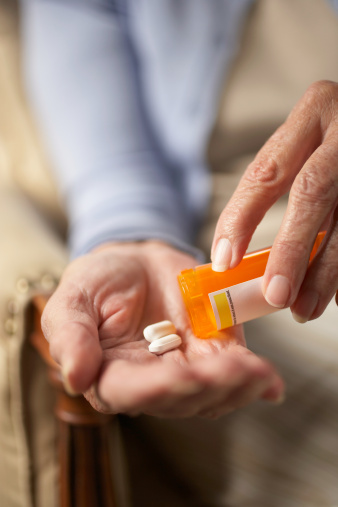A recent article on newspress.com highlights the continuing uphill battle faced by Florida to keep its senior citizen population safe from prescription drug addiction. Despite rampant statewide reforms and national influence, the number of individuals among Florida’s elderly population seeking treatment for prescription drugs continues to rise.[1]
According to government data, the number of adults age 50 and older seeking help for a substance abuse issue is expected to double to almost 6 million by 2020. Many experts speculate that as baby boomers – a generation that used drugs a lot more freely than their predecessors – get older, this will continue to cause an inflation of these numbers.In 2013, more than 12,000 baby boomers died from an accidental drug overdose.
Another cause continues to be the post-operative pain relief routine that doctors prescribe seniors undergoing major surgery, which usually includes a substantial dose of oxycodone. As their health starts to deteriorate, many seniors are depending on these drugs to keep them active and pain-free. According to USA Today, painkiller prescriptions for older adults (ages 65 and older) have ballooned to 55 million, a 20 percent increase in the last five years. During the same time, the number of prescriptions of anti-anxiety medication to the same group increased 12 percent.
Some Other Numbers about Seniors and Older Adults
- The rate of illicit drug use in older adults (age 55 – 64) more than doubled between 2002 and 2012.
- Five percent of Florida seniors are chronic drinkers, meaning they consume at least 60 alcoholic beverages per month.
- In 2012, the number of seniors who were misusing or dependent on prescription pain relievers within the previous 12 months reached an estimated 336,000 – up from 132,000 10 years earlier.
- The rate of overdose deaths among people 55 and older, regardless of drug type, nearly tripled from 1999 to 2010.
- No population group is prescribed more drugs than seniors.
A Growing National Trend
 While Florida appears to be a hot bed for baby boomer substance abuse and addiction, this is a problem that is impacting older adults across the U.S. Older adults are getting arrested for narcotics, dying from drug overdoses and abusing drugs to the point of addiction more than ever before. Not coincidentally, these rates have peaked as baby boomers (born 1946 – 1964) have reached middle age.
While Florida appears to be a hot bed for baby boomer substance abuse and addiction, this is a problem that is impacting older adults across the U.S. Older adults are getting arrested for narcotics, dying from drug overdoses and abusing drugs to the point of addiction more than ever before. Not coincidentally, these rates have peaked as baby boomers (born 1946 – 1964) have reached middle age.
The CDC reports that the rate of accidental deaths by overdose for adults aged 45-64 increased by 11 times between 1990 (when the baby boomers were not yet middle age) and 2010. In 2013, more than 12,000 baby boomers died from an accidental drug overdose.
The challenges in treating this group of Americans include navigating around a host of growing physical health issues, addressing the personal loss that is often associated with getting older, and changing their misconceptions about substance abuse. Another problem is that a generation that loved using mind-altering drugs in their youth (more so than any other generation) is now smack dab in the middle of the largest era of rampant national opioid abuse in history. Pain pill use is the second most popular way for boomers to get high, behind marijuana.
Why Are Seniors Abusing Drugs More Than Ever?
Many view drug abuse and addiction as primarily a teenage or young adult problem, but that is an incorrect assumption. While rates of illicit drug use have declined among teenagers and young adults over the past decade, rates have increased among adults over 50.
Over-Prescription of Opioids and Benzos
The most common reason experts give is the tendency for adults in this group to seek medication for chronic pain, menopause and other age-related issues. When doctors give a prescription (something they’re more likely to do when directly asked by a patient)[2], there’s always a chance of an addiction forming, especially when a patient becomes dependent on drugs for everyday relief.
One in four adults over age 50 use psychoactive medications (mostly opioids and benzodiazepines), according to data reported by the Substance Abuse and Mental Health Services Administration (SAMHSA). 2010 data from the CDC showed that 75 percent of prescription drug overdose deaths involved opioids, with a third of them also involving benzodiazepines. Nearly 30 percent of people between ages 57 and 85 use at least five prescription medications regularly.
Old Habits Die Hard
The generation that grew up in an era that romanticized drug use and rebellion is now preparing to retire. Uninhibited by work responsibilities and parental duties, many are using the extra found time and money to get back into a favorite pastime and relive their youth. There are approximately three million seniors with a drug or alcohol addiction; that number is expected to triple by 2020.
relive their youth. There are approximately three million seniors with a drug or alcohol addiction; that number is expected to triple by 2020.
Part of the problem, as alluded to above, is the casual attitude with which the generation views drug and alcohol use. Another problem is that while their opinions on substance abuse may not have changed, their bodies have. Many older adults don’t respond to or recover from drug and alcohol abuse the way they did when they were younger.
Tolerance weakens with age as a result of changing body chemistry, and with many also taking several prescriptions for their health, the risk of mixing prescription drugs and alcohol (or illicit drugs) is greater. Additionally, the damage caused by an unfortunate fall or accident due to intoxication could be greater on an older adult than on a younger one.
Onset of Depression
People often view old age as a golden time in a person’s life when they can relax, work on hobbies and do the things they’ve always wanted to do. Unfortunately, things aren’t always so ideal. Deteriorating physical health, difficult financial situations, an inability to do things they were once able to and the loss of friends and loved ones can take their toll. Depression and substance abuse are often toxically linked.
Be Aware of the Signs of Abuse and Addiction
Despite being at greater risk of health consequences from drug or alcohol abuse, these things are often overlooked in older adults and seniors. Friends and family members almost never expect it, there are fewer bosses and coworkers to help recognize the problem and adult children often live in their own home and are unable to constantly monitor their parents.
Additionally, an older adult who is found to be regularly intoxicated may be assumed to be suffering from dementia, instead of a substance abuse disorder. An older adult isn’t likely to admit an addiction or the need for help, fearing shame and judgment from family and friends. It’s important for friends and family members of older adults to be alert and aware of medication’s they’re taking and the presence of any alcohol or narcotics in the home.



